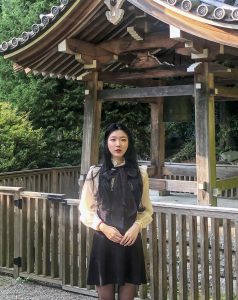Interested in what you can do with a degree in Asian Studies? In our Spotlight Interview Series, we ask our students, postdocs and alumni about their career paths, how they became interested in Asian Studies and for any advice they would give to current students. In this interview, alumna Haoyue Li looks back on her MA experience and forward to her PhD and explains how her childhood pastime and nostalgia for home inspired her research topic today.

Tell us a little about yourself, your background and how you became interested in Asian languages and cultures?
After taking a BA (2014-2018) and MA (2018-2020) degree in the Department of Asian Studies at UBC, I am now starting my doctoral study under the supervision of Professor Alison Bailey. My interest in premodern Chinese fiction, drama and cultural history can be traced back to primary school, when reading premodern Chinese literary works after daily heavy coursework was the most delightful time for me.
During my early undergraduate days, I took several courses of Chinese literature and history, as studying familiar texts helped me handle my nostalgia for my motherland. As I took more and more classes in the Asian Studies department, I realised that I love Chinese Studies, since I can feel them in my blood, and studying China’s past outside its geographical zone provides me with a more profound and critical visual angle to look anew at my cultural heritage.
What did you enjoy most about your MA experience? How did your MA experience influence you to continue with Asian Studies at UBC?
When I look back on my MA experience, the first thing I feel is grateful – for my supervisor and my classmates, because they gave me the courage to continue this rather long academic quest. Unlike undergraduate courses where there are many students in each class, seminar courses are much smaller and it is easy to feel lonely. Also as we grow as graduate students, our research topics usually become more and more specialized or narrowed. Thus, it is not easy to share our feelings and thoughts to family members who are not so familiar with our research interests. However, I am glad to make close friends with several other graduate students. Although our specializations are different, we often share our research thoughts and provide mental support to each other. During this process, they inspired me to (re)consider my research, particularly the scope of primary texts and the relevant methodology.
Could you explain to a non-expert what you are researching and why it is significant?
My research focuses on odours, olfactory sensations, olfactory aesthetics, and olfactory culture in late-imperial Chinese literary works and historical texts. I believe this invisible and inaudible sensation deserves more attention, as there are many classical olfactory motifs, topoi, and symbols in premodern Chinese writings. These olfactory narrations demonstrate that there used to be particular historical moments when odours were often given specific cultural connotations, aesthetic and philosophical implications, and ideological messages.
Meanwhile, odours provide another approach to (re)consider many well-studied literary works. For example, through taking the mid-eighteenth Chinese novel Story of the Stone, one of the “Six [Chinese] Classic Novels,” as the case study, my master’s thesis examines the mechanism of odours as both narrative technique and reading method, especially its significance in (re)constructing atmospheres, affects, theme, and fictional spaces in literary works.
What are your career and academic goals? And how did UBC help you achieve them?
Both researching and teaching are my ultimate academic goals. I wish to publish writings on olfactory narrations and olfactory aesthetics and also dream of being a teacher to cultivate my students, just like my supervisor who always instructs, encourages, and supports me. For me, UBC Asian Studies Department is not only one of the best programs with many great literary experts and cultural historians, but also a home-like community that truly cares for all of its students. Whether it be during my undergraduate or graduate study, I have always felt welcomed and supported. I believe this mental support is as important as academic support, since the doctoral study is a long and challenging quest. It is great to know that we are never alone on this voyage.
Can you give any advice to new students in our program or for students considering applying to it?
For those considering pursuing a PhD: unlike bachelor’s and master’s degrees, the doctoral process is much longer and needs both passion and research skills so my first suggestion is to ask yourself several questions. Do I really love academic research and writing research papers, or do I just enjoy reading and learning things about this subject? Will my passion for this discipline support me to finish this five-year or even longer academic journey? Am I confident in my research and writing skills? If your answers are all “yes,” then I believe taking doctoral study in Asian Studies at UBC is definitely one of the best choices.
For newly enrolled graduate students in our department, I feel consulting with supervisors and truly listening to their advice and suggestions is crucial because they are much more specialized in academia, in addition to having more life experiences and wisdom. It is also important to communicate with other graduate students, as they are likely to more easily understand your problems since we all have the same “career,” similar research areas, and are close in age. It is also helpful to browse relevant academic websites, such as famous journal articles in your research field and departmental webpages of other institutions. Through reading the updated monographs, journal articles, and research topics, you can learn much information and be inspired to (re)consider your own research.
As one of the department’s new graduate student representatives this year, I look forward to meeting new and older graduate students and to represent us all in our academic lives at UBC.


